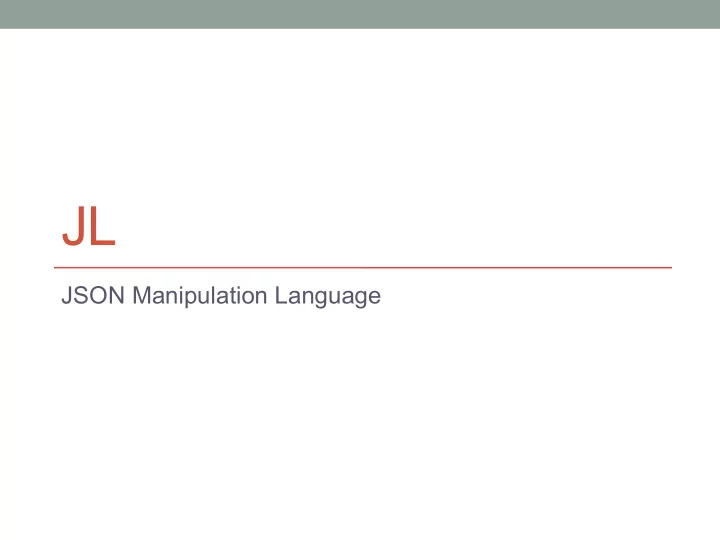

JL JSON Manipulation Language
Json Objects and JL’s Motivation [ { name: "John", from: "New York" }, { name:"Bob", from:"California" } ] Typically access using obj[0][“from”]
Json Objects • But what if you have and you want all of Johns Roommates? [ { "name": "John", "homes": [ { "city": "New York", "roommates": ["Bill","James"] }, { "city": "San Francisco", "roommates": ["Chris"] } ] } .... ]; object[i][“homes”][j][“roommates”] ?? �
JL Language Design • General • General purpose language for json manipulation + other tasks • Simple • No variable declaration, no nested function, only two scopes (local & global), garbage collected. • Types are automatically promoted. Lists and Hashmaps can be concatenated to other Lists and Hashmaps • Dynamic • Platform neutral • JSON support • Lists in JL are defined as “[]”. Hashmaps are defined using “{}” • Inside our language there is a JSON parser • An idiom: apply selector to parse(get(“http://…”))
Full Feature Language fun fib(x) { � � if (x == 0) then � � � return 0; � � if (x == 1) then � � � return 1; � � return fib(x-1) + fib(x-2); � } �
Easy Manipulation of Lists + Maps result = [1,2,3] + [2,3]; � print(result); � � [1,2,3,2,3] � � result = {“test”:2} + {“test2”:3}; � print(result); � � {“test”:2, “test2”:3} � � �
Selectors • object[:string] � • Descend one level from the root • object[::string] � • Get all which match • object[::string>] � • Get parents • object[::string, restriction] � • Get all which match and obey the restriction
Back to John’s roommates.. [ { "name": "John", "homes": [ { "city": "New York", "roommates": ["Bill","James"] }, { "city": "San Francisco", "roommates": ["Chris"] } ] } ];
Using JL Selectors //restriction function � fun findJohn(obj) { � � return obj[:”name”] == “John”; � } � � //the selector � result = []; � johnList = object[::”name”>, findJohn]; � john = johnList[:”0”]; � foreach roommateList : john[::“roommates”] do{ � � result = result + roommateList; � } � print(result); �
Architectural Design • Lexical Analyzer • Parser • Semantic Analyzer • Translator and Executor • Top Level – “JL”
Architecture JL compiler JL source gets JSON JL scanner scanner tokens tokens JL parser JSON parser AST AST Semantic Checking JL Interpreter/Bytecode
a = "hello"; Bytecode b = {"value":4}; fun listAdd() { c = 3; New Codes: return [a,2]+[c]+ [b[:"value"]]; Lis Sel } Slc Has print(listAdd()); Rsn Nit 23 Lfp 1 24 Lis 1 2 global variables 11 Jsr 16 25 Add 0 Jsr 2 12 Jsr -1 26 Lis 0 1 Hlt 13 Drp 27 Lit 2 Ent 0 14 Lit 0 28 Lit "value” 3 Lit hello 15 Rts 0 29 Co 4 Str 1 16 Ent 1 30 Lod 0 5 Drp 17 Lit 3 31 Slc 1 #selector 6 Lit 4 18 Sfp 1 32 Lis 1 7 Lit "value” 19 Drp 33 Add 8 Has 1 #hashmap 20 Lod 1 34 Rts 0 9 Str 0 21 Lit 2 35 Lit 0 10 Drp 22 Lis 2 #list 36 Rts 0
Selector Bytecode result = a[::"name">,atLeastXFollowers]; 8 Rsn 63 //jump to restriction function 9 Lis 1 //list of restrictions 10 Lit > //postfix 11 Lit "name” //selector name 12 Dco //double colon 13 Lod 2 //load the object 14 Slc 1 //selector length + start selection
Lessons Learned • Get “Hello World” working as soon as possible. Everything will flow from that. • Do an interpreter; it really does help to test newly added features. • Use an incremental development strategy – don’t try to put everything together in one go • Build big code examples before starting
Thanks! And a live demo....
Recommend
More recommend